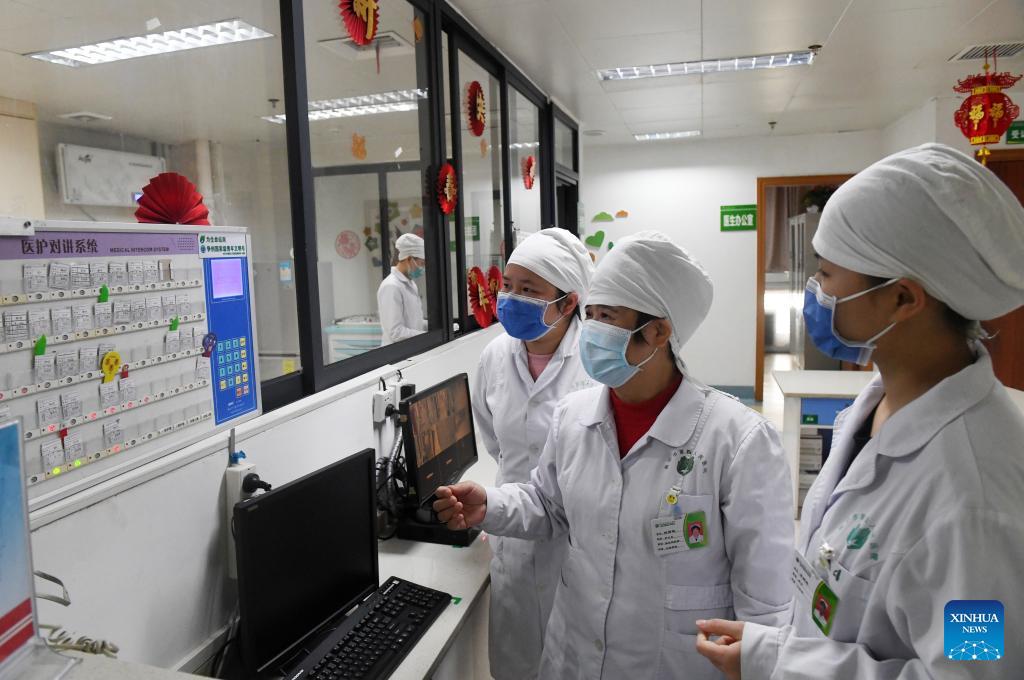
 0 Comment(s)
0 Comment(s) Print
Print E-mail Xinhua, December 2, 2024
E-mail Xinhua, December 2, 2024
This file photo taken on Feb. 16, 2022 shows Du Liqun (2nd R), head nurse of the HIV/AIDS ward, communicating with colleagues at the Fourth People's Hospital of Nanning, in Nanning, south China's Guangxi Zhuang Autonomous Region. [Photo/Xinhua]
"Amid a chaotic struggle, a police officer was accidentally scratched by a drug dealer known to be HIV-positive," a university student retold the medical information he had memorized in just 30 seconds.
He continued, "In a race against time, the officer immediately started post-exposure prophylaxis (PEP), following medical advice, and after completing a rigorous 28-day treatment, he tested negative for the virus."
This was part of the ninth National College Student AIDS Prevention Knowledge Competition, held at Beijing Forestry University on Saturday, one day before the 37th World AIDS Day on Dec. 1.
Established in 2016, the national knowledge competition aims to raise awareness among young people about HIV/AIDS. Since its inception, it has engaged 6,320 universities and reached a total of 17.42 million students, according to Sun Xinhua, president of the Chinese Foundation for Prevention of STDs (sexually transmitted diseases) and AIDS.
This competition is just one of many efforts China has made in its long-standing fight against the "incurable devil" over the past four decades since the country reported its first case in 1985.
The theme of this year's anti-AIDS campaign in China focuses on taking the right path to end AIDS and improve public health through a society-wide synergy. The campaign aims to address the public health threat and help achieve the goal of HIV/AIDS elimination by 2030.
HIV, the virus that causes AIDS, can often be controlled with early detection and treatment, preventing the progression to AIDS. That's why timely interventions, like PEP, are crucial in combating the disease and early treatments might be the silver lining before the situation worsens beyond control.
According to experts, PEP can be more than 80 percent effective when taken correctly. The sooner PEP is started after exposure, the higher the success rate. It is most effective if taken within 2 hours and should be started no later than 72 hours after exposure. Completing the full 28-day course is crucial, and individuals should avoid high-risk behaviors during treatment.
As of now, PEP outpatient clinics have been established in 31 provinces, autonomous regions, and municipalities across China, with a total of 924 clinics in operation, according to information released in mid-November by the Chinese Center for Disease Control and Prevention (China CDC).
"As an incurable disease that poses serious risks to both individuals and society, AIDS is not distant from anyone," said Lyu Fan, deputy director at the National Center for AIDS/STD Control and Prevention of China CDC. "Raising awareness and teaching self-protection among key groups is crucial to reducing transmission risks and preventing new infections."
China has largely halted the spread of HIV through blood transfusions and blood products, while transmission from mother to child and among injection drug users has dropped to historic lows, said Chang Jile, deputy head of the National Disease Control and Prevention Administration.
However, new HIV infections in China are rising among both younger and older demographics with sexual transmission remaining the main route of spread, according to Li Taisheng, director of the Department of Infectious Diseases at Peking Union Medical College Hospital.
This year, a new edition of China's AIDS diagnosis and treatment guide has been released, outlining a series of preemptive measures to shield people from AIDS, among which the most important measure is the use of condoms to prevent sexual transmission of AIDS.
In the run-up to World AIDS Day, Chinese Vice Premier Liu Guozhong visited China's CDC on Friday and connected via video with a hospital in Kashgar, Xinjiang Uygur Autonomous Region, to gain a detailed understanding of the current AIDS prevention and control efforts in the region.
"Combating AIDS is a key task in building a healthy China," Liu said. "Through joint efforts across society, China has maintained overall control of the AIDS epidemic at a low prevalence level."
Liu acknowledged that the factors contributing to AIDS transmission are complex and diverse, making prevention and control challenging. He stressed the need for continued efforts to strengthen monitoring and early warning systems, increase proactive screening and testing, and implement more comprehensive intervention strategies.
In the meantime, humanitarian support for people with HIV should also be enhanced to help them build confidence and better integrate into society, Liu said.